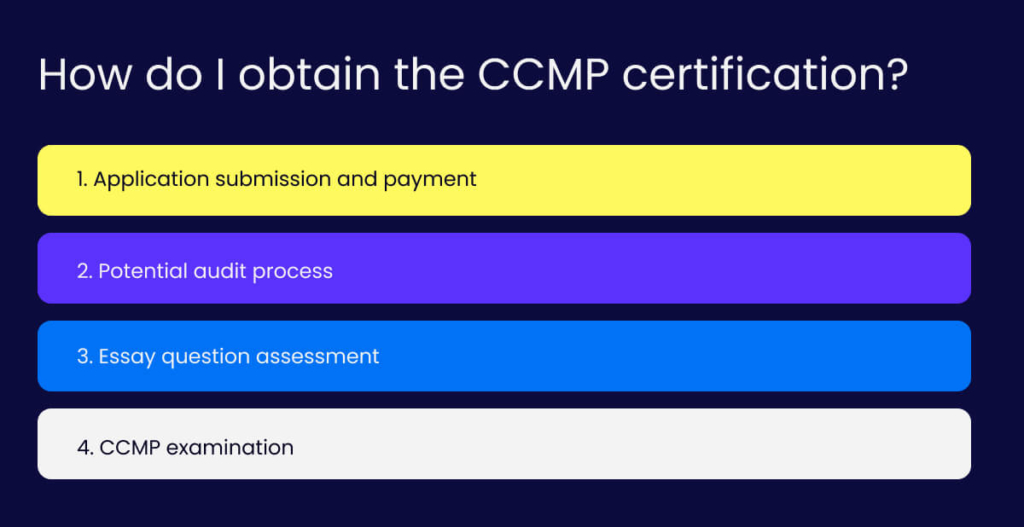The Certified Change Management Professional (CCMP) certification is a top choice for change experts. Many see it as one of the most valuable certifications in the field.
But how does it compare to other change management training?
When looking at programs, check what each one covers. Some focus on big company changes, while others teach small-scale, hands-on change methods. The CCMP is well-known, but that’s not the only thing to consider.
Consider your job and career needs. Will the certification help you lead change at work? How much does it cost? Is it worth your time and money? Pick the program that fits you and your work best. Choose one that will help you manage change well.
This article will explore the CCMP certification, show you how to get one, and compare it to other change management training options. By the end, you’ll know whether CCMP is right for you.
What is the CCMP certification?
The CCMP is a global certification for change management experts offered by the Association of Change Management Professionals (ACMP). It shows that you know how to guide organizations through changes.
To get the CCMP, you must know the ACMP’s Standard for Change Management.
This standard covers five key areas:
- Evaluating change impact and organizational readiness
- Formulating a change management strategy
- Developing change management plans
- Executing change management plans
- Completing the change management effort
You also need to pass a tough exam. This ensures that certified pros can lead and carry out change projects well.
These skills include analyzing the impact of change, creating effective change strategies, developing and executing change plans, managing stakeholder engagement, and measuring and reporting on change progress.
How do I obtain the CCMP certification?

The CCMP is good for anyone who manages or leads change projects, such as HR professionals, project managers, organizational development specialists, business analysts, and executives or senior leaders.
Like other change management certifications, the CCMP teaches skills for successful organizational change.
Getting the CCMP involves four main steps. Each step tests your change management knowledge and skills.
Here’s a closer look at each step:
- Application submission and payment
First, you submit a full application with the fee. The current cost is $595 for ACMP members and $745 for non-members. You have 12 months to meet all certification requirements. ACMP reviews applications fast, usually within five business days. This helps you move quickly if your information is correct and complete.
To be eligible, you need to meet one of two requirements. The first option is three years of change management experience within the last seven years. Alternatively, you can qualify if you have 21 hours of change management training and two years of experience within the previous seven years.
- Potential audit process
ACMP may randomly check some applications. If chosen, you must provide more proof of your credentials. This includes evidence of your change management experience, education, and training.
For experience, you should show project descriptions, roles and responsibilities, and involvement dates. You’ll also need to show course certificates, training dates and duration, and course outlines. Keep good records of your work and education to make this easier.
- Essay question assessment
You must answer five essay questions. Each relates to one of the five process groups in ACMP’s Standard for Change Management. This tests how well you can apply change principles to real situations.
For example, you might be asked to describe how you’d assess an organization’s readiness for change, explain your approach to developing a change management strategy, or detail how you’d handle resistance to change. You must answer at least three of five questions well to pass. ACMP provides guidelines on what they’re looking for in your answers.
- CCMP examination
The final step is a big exam. It has 150 multiple-choice questions on various change management topics. You have three hours to complete it. The exam tests both the theory and practical use of change management principles.
The exam covers change management models and methodologies, stakeholder engagement techniques, communication strategies for change, risk assessment and mitigation in change projects, and measuring and evaluating change success.
After the exam, you’ll get your results right away. If you pass, you’ll receive your CCMP certification. If not, you can retake the exam after a waiting period.
How valuable is the CCMP certification?
A CCMP certification offers several benefits. It shows dedication to change management, knowledge of ACMP’s change practices, and ongoing professional growth in change management. It can boost your career and improve your change management skills, benefiting both you and your organization.
Specific benefits include career advancement, as many organizations prefer or require CCMP for senior change management roles. There’s also higher salary potential, as certified professionals often command higher salaries due to their proven expertise.
You’ll gain networking opportunities, as CCMP certification gives you access to a global community of change management professionals.
To maintain your certification, you must earn professional development units (PDUs) to stay up-to-date with the field. This supports continued learning. Lastly, the certification increases your credibility, demonstrating your commitment and expertise to clients and employers.
CCMP vs. other change management training
CCMP is one of several change management certifications. Let’s compare it to other options:
Certification from change management consultancies
Some consulting firms offer their own certifications. Prosci is a well-known example. They provide various training options, both online and in-person. However, these often use their own methods that may differ from ACMP’s approach.
Prosci’s certification, for instance, focuses on their ADKAR model (Awareness, Desire, Knowledge, Ability, Reinforcement). This differs from CCMP’s broader approach based on the ACMP Standard.
Other consultancy certifications include LaMarsh Global’s Managed Change Certification and Kotter International’s Change Leadership Certification. These programs often provide more specific methodologies but may be less widely recognized than CCMP.
Certificates and training at accredited educational institutions
Many universities now offer change management programs. For example, Northwestern University has relevant degree and certificate options. These programs often provide a wider theoretical base with practical application.
University programs might include Master’s degrees in Organizational Change, Graduate certificates in Change Management, and Executive Education programs focused on leading change. These programs often offer a broader business context but may take longer to complete than professional certifications.
Change management training without certification
Some professionals may prefer training without certification. These programs can be more flexible and focused. They may suit those with lots of experience or those in organizations with established change methods.
Examples include short courses on specific change management topics, workshops on change leadership skills, and online self-paced learning programs.
These options allow for targeted skill development but may not carry the same weight as formal certifications.
How to choose the right training program

Picking the right change management training is crucial. While CCMP offers benefits, it’s one of many options. Each has its own good and bad points. Consider these factors when choosing:
Content evaluation
Look at what the program covers. Check for a full range of change management principles and practices. See if it balances theory with practical use. Key areas to look for include change models and frameworks, stakeholder management, communication in change, dealing with resistance, and measuring change success.
Career impact assessment
Research how the certification might help your career. Ask how employers view it. Check if it could lead to promotions or higher pay. Talk to others who’ve done the program about how it helped them. Consider job postings that mention the certification, salary surveys for certified vs. non-certified professionals, and career paths of those who’ve earned the certification.
Employer alignment
Check if your employer prefers certain certifications or methods. Ask HR or management about their preferences. Consider how well the program fits your company’s practices. Questions to ask include whether your company uses a specific change management methodology, if there are any preferred certifications for advancement, and if the company will support the certification cost.
Digital relevance
See how well the program covers digital transformation. Look for content on managing remote teams and using digital tools in change processes. Important topics include leading virtual change initiatives, digital tools for change management, and adapting change strategies for digital transformations.
Cost-benefit analysis
Compare the program’s cost to its potential benefits. Think about both money and time investments. Check if your employer offers financial support for training. Factors to consider include direct costs (fees, materials, travel if needed), indirect costs (time off work, opportunity cost), potential salary increase or promotion opportunities, and long-term career benefits.
Complementary certifications
Think about combining certifications for a broader skill set. For example, pairing CCMP with project management could make you more versatile. Complementary certifications might include Project Management Professional (PMP), Agile certifications (Scrum Master, SAFe), and Six Sigma certifications.
CCMP: A standard in change management
The CCMP certification is a global standard in change management. It proves expertise in leading organizational changes and requires experience, training, and passing a tough exam.
While other certifications exist, CCMP’s comprehensive approach makes it valuable. It’s widely recognized in the industry.
Pursuing CCMP should align with your career goals and employer needs. It’s a respected qualification in change management.
In conclusion, whether CCMP is worth the investment depends on your specific situation. Consider your career goals, your organization’s needs, and available alternatives.
With careful thought, you can make the right choice for your professional development in change management.
FAQs
The Certified Change Management Professional (CCMP) certification costs $645 for ACMP members and $795 for non-members.
The CCMP exam is a 3.5-hour test requiring significant preparation. It’s designed for professionals with at least 3 years of change management experience and indicates a moderate to high level of difficulty.

